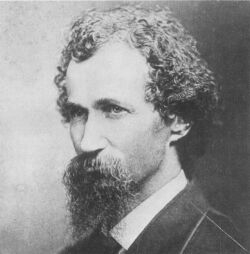
Thomas Henry Kendall, was an Australian author and bush poet, who was particularly known for his poems and tales set in a natural environment. He appears never to have used his first name — his three volumes of verse were all published under the name of "Henry Kendall".
Bertram William Mathyson Francis Stevens was Australian journal editor ; literary and art critic; and anthologist.
"Bell-Birds" is a poem by Australian writer Henry Kendall that was first published in The Sydney Morning Herald on 25 November 1867.
The Old Whim Horse is a poem by Australian writer and poet Edward Dyson. It was first published in The Bulletin magazine on 30 July 1892, and later in the poet's collection Rhymes from the Mines and Other Lines (1896).
A Mid-Summer Noon in the Australian Forest is a poem by Australian poet Charles Harpur. It was first published in The Empire magazine on 27 May 1851, and later in the poet's collection titled Poems (1883).
"Where the Dead Men Lie" is a poem by Australian poet Barcroft Boake. It was first published in The Bulletin magazine on 19 December 1891, and later in the poet's poetry collection Where the Dead Men Lie, and Other Poems (1897).
The Women of the West is a poem by Australian poet George Essex Evans. It was first published in The Argus newspaper on 7 September 1901, and later in the poet's poetry collection The Secret Key and Other Verses (1906).
Andy's Gone With Cattle is a poem by Australian writer and poet Henry Lawson. It was first published in The Australian Town & Country Journal on 13 October 1888.
The Sick Stockrider is a poem by Australian poet Adam Lindsay Gordon. It was first published in Colonial Monthly magazine in January 1870, although the magazine was dated December 1869. It was later in the poet's second and last poetry collection Bush Ballads and Galloping Rhymes (1870).
"Bill the Bullock Driver" is a poem by Australian writer Henry Kendall that was first published in The Australian Town and Country Journal on 1 April 1876.

The Teams is a poem by Australian writer and poet Henry Lawson. It was first published in the Australian Town and Country Journal on 21 December 1889. It was later published in the poet's poetry collection In the Days When the World Was Wide and Other Verses in 1896.
Where the Pelican Builds is a poem by Australian poet Mary Hannay Foott. It was first published in The Bulletin magazine on 12 March 1881, and later in the poet's collection Where the Pelican Builds and Other Poems (1885).
"The Song of Ninian Melville" is a poem by Australian writer Henry Kendall that was first published in the author's suppressed edition of his poetry collection, Songs from the Mountains in 1880. The poem is a set of verses satirising Ninian Melville, at that time Member for Northumberland in the Parliament of New South Wales. Immediately after publication the publisher, believing the political satire to be possibly libellous, recalled the edition after some 250 copies had been distributed. The satire was excised and replaced by the poem "Christmas Creek". The book was re-published in January 1881.
This article presents a list of the historical events and publications of Australian literature during 1957.
T. Inglis Moore (1901-1978) was an Australian writer, anthologist and academic who was born in Camden, New South Wales.
The Wind at Your Door (1959) is a one-poem volume by Australian poet R. D. Fitzgerald. The poem was originally published in The Bulletin on 17 December 1958, and later in this 275 copy Talkarra Press limited edition, signed by the author. It won the Grace Leven Prize for Poetry in 1959.
"A Death in the Bush" (1868) is a long narrative poem by Australian poet Henry Kendall. It was originally published in the 1868 edition of Williams's Illustrated Australian Annual, and later appeared in the author's collection Leaves from Australian Forests (1869).
"Faces in the Street" (1888) is a poem by Australian poet Henry Lawson.
"The Buried Chief" (1886) is a poem by Australian poet Henry Parkes.
"Song of the Shingle Splitters" (1874) is a poem by Australian poet Henry Kendall.

